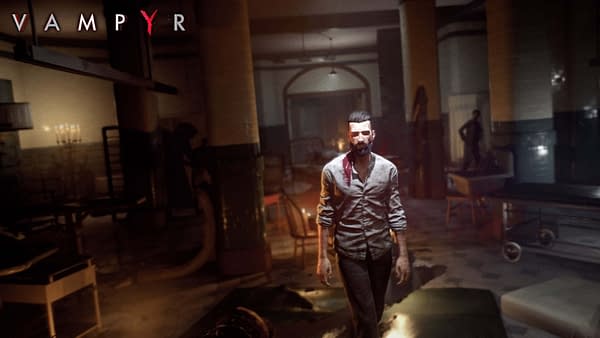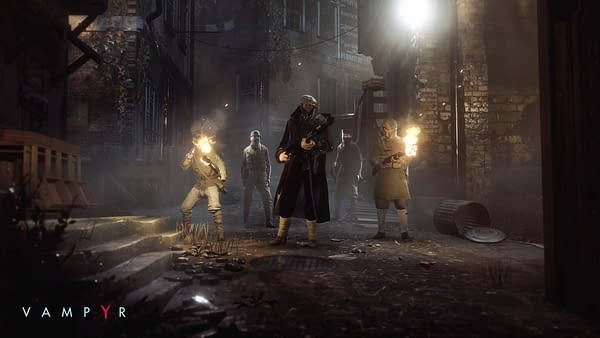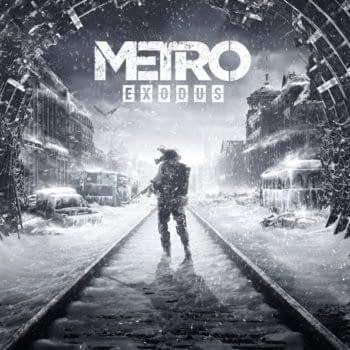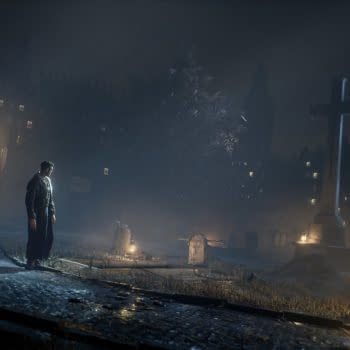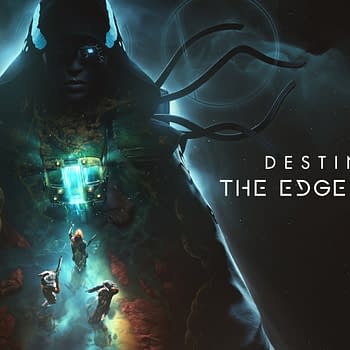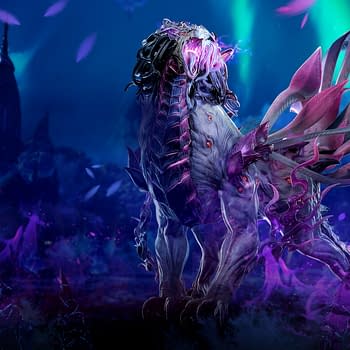Posted in: Games, Recent Updates, Video Games | Tagged: dontnod, entertainment, focus interactive, games, vampyr, video games
Vampyr Review: The Story in Blood
The B game is somewhat of a rarity nowadays. The games market is seemingly a place of extremes. In the last decade or so, games with a smaller development team but money from a publisher have somewhat fallen by the wayside in favour of either tiny indie games or huge franchise tentpoles. The middle ground between the two has somewhat dissipated as indies wield complete artistic freedom and publishers chase the best graphics, the biggest set pieces, and of course, the most franchisable property. However, every once in a while, a B game will rear its head around in the public zeitgeist. The latest effort by Life is Strange developer Dontnod, Vampyr, is one such special breed.
Like Remember Me, the team's previous action-based effort, Vampyr takes more risks than most AAA games while still having the veneer of a big world and decent look. However, unlike Remember Me, Vampyr doesn't leave the taste of a lot of unfulfilled potential. Instead, it is actually something quite special.
Before getting into the depths of the game, let's take a step back.
The game puts you in the shoes of Dr. Jonathan Reid, one of England's best early-1900s surgeons. Returning from World War I, he is trying to find his way back into a life in London. But before he can settle, he finds himself awakening from death, now reborn as a vampire (or as the game likes to call them, an Ekon). That's the general premise of the game, and you'll quickly find yourself hurled into a world of horror and the supernatural. A London being ravaged by various monstrosities and importantly, an epidemic believed to be the Spanish Flu. You'll find yourself quickly hurled into the role of doctor again soon and from there, the game sprawls into a broader mystery surrounding the sickness claiming the inhabitants of the city.
If you've spotted the dichotomy of the game, then you are on the right track of understanding what makes Vampyr interesting. In the game, you are tasked with spinning the plate of being both a vampire who needs blood to grow stronger and being a doctor who has a duty to help his patients and the world around him. The push and pull is at the centre of Vampyr, and it is explored in some truly interesting ways.
Perhaps the most interesting is the battle Dontnod devises that puts both the gameplay and story against one another. There is often talk about ludonarrative dissonance around games, which is a fancy way of explaining a disconnect between story and gameplay. However, in Vampyr, that's not right. The two are very much linked, but in a very antagonistic way — two territorial vipers vying for the player's affection. This is played out by way of the game's Citizen system. In the game, there are several hub world areas that are full to the brim of people to talk to. A large portion of your playthrough will be spent just talking to the inhabitants of the world, helping them with their problems, and checking up on their health. Their happiness has an effect on the areas they live in, with districts turning into chaos if you choose to neglect their problems.
However, the conflict comes when you realise you can eat any one of these NPCs if you have the necessary level to do so. If you decide to chow down on any given citizen, you will get a generous helping of experience to spend on stats and combat abilities. However, if you do decide to partake in consuming your fellow inhabitants, you could miss out on story beats, the chance to get to know them as characters, and what their stakes in this world is.
That runs antithetical to everything we usually understand about dialogue-based games like your Mass Effects. Usually, you are encouraged to talk to everyone, about every subject you can. Here, you are tempted to cut that experience off for a reward of making the game easier. That's because the game has no difficulty setting. You can go your whole run without eating anyone, but you will find, especially towards the end of the game, you will be woefully under-levelled. While you might try to be a paragon in this world, if you don't have the skill to beat enemies around you, you might be forced to consume someone.
Most of these citizens are worth getting to know, as their stories of how a London tearing itself apart and their parts in it are all fairly nuanced (bar a few truly bad apples). There is a level of investigation around these people, too, as you talk to everyone in a district, you will find their lives are interwoven with stories and secrets where people you thought good might hide something terrible and those you thought bad might be consumed by the tough world and their sadness.
Of course, the more you find out about these people the more experience they yield if you do decide to eat them, so even if you want to get a quick experience burst, you are forced to go face to face with your food to get the maximum out of it. You are forced to humanise your meal. It's a nuanced internal conflict that will tempt you both ways, either eating the people around you or keeping them safe and risking struggling though incredibly hard enemies.
These people all help to build one of Vampyr's strongest assets: its world. The main story in the game is more than serviceable, creating a fiction about getting to the bottom of what is happening to London, but the true star is the richness of the environment. The sheer amount of face time with the streets and the supernatural order give Vampyr this overwhelming sense of density. The good kind too. From larger organisations such as an order of elitist vampires who seem more than a little concerningly patriotic to small-scale stories such as two men trying to come to terms with their feelings for one another, the world is absolutely packed with substance and new things to discover about it.
That said, it can be so large, and at worst vague, that it can be hard to grasp the specifics of how it works. At times I even thought I spotted small inconsistencies with some of the lore. However, it ends up not mattering. While the seams of the game's budget show as you navigate this portion of London carved out for you, these stories, the history involving the supernatural, and the relationships you build make the world feel like it has a soul to it. It's got a humanity.
I hope that is what you are coming to the game for, because it is the main way you will be interacting with it. If you are a lover of dialogue trees, Vampyr will be a gluttonous feast. About 70% of my time was spent in conversation with various NPCs, be that the main story, side quests, or just getting to know people.
Vampyr doesn't ease you into this process either. After the initial setup of the game, you arrive at your new hospital — and I'm being quite literal here when I say I nearly spent an hour and half talking to every person there. It's a long process — one that literally revolves around only dialogue trees. It's pretty intense, and the game rarely lets up on that front.
As for the other projected 30% of the game, most of that will be the combat. This is one of the areas where the game is fairly unremarkable. Alongside its passable graphics, the game's combat stacks similarly. It's pretty much what you would expect from a third-person action game. It's more Dark Souls than the Batman Arkham games, but there is a huge focus on abilities and upgrades. You get to spend your experience on various things such as your health and your blood meters, which dictate your attacks, but also which "spells" you want. You can put a lot into a ranged blood lance and then decide if you want it to spec towards being one big bolt or three smaller ones. There is a close-range claw that you can spec towards either stunning or regaining some of your blood. There are even three supers that unleash devastating attacks, and you will have to choose which of the abilities you most want to use.
There is a surprising amount of choice to be had here. However, when you get into combat, you will mostly just be trying to dodge incoming attacks and manage your abilities until you can get the kill. It's nothing revelatory, but it is at least enough to never get too boring or feel unfair when fighting smaller foes.
The frustration can come in the game's bosses. They are again, functional but fairly unremarkable — especially if you have been holding off on eating the inhabitants of the world, towards the end you will find they can be exceedingly hard. Here's where the conflict between gameplay and story is most pronounced, as it can feel impossible to topple a later boss without beginning to eat some of the people you've begun to identify with. This is, of course, the dichotomy in action and the idea at its most intense, but that doesn't stop you from wanting to throw your controller across the room after your 10th try on a boss.
But at the end of the day, that is the point. Vampyr is a game about your choice. From a core structural position, it's embedded into the very fibre of the game. Every choice has a downside, be it a district falling into chaos, you missing out on the story, or you swearing at your TV because the game is too hard. That is where Vampyr's quiet greatness lives.
A lot of times we write in reviews "a game isn't quite the sum of its parts." At the highest end of AAA production, there is a carefully crafted sheen to a game's system, so all of it feels smooth, detailed, gone over with a fine-toothed comb by a hundred people. However, that can come at the cost of a game not working as a whole. Not taking enough risks. Merely being a popcorn movie. Vampyr is the exact inverse of this. It has problems, from an unremarkable combat system, a rigid execution of London and parts of the lore that feel somewhat vague or unexplored. Yet, it's a game that sheds those problems and transcends into something excellent.
The care and passion for this project by Dontnod shines above any one of its flaws. The ideas it plays with are beyond what most are doing in the genre now, with a dense world propped up by some truly exciting risks. Pitting narrative and gameplay against each other can often cause a disconnect, but here is it so purposeful and cleverly implemented that it transcends. It's constantly trying to make itself harder and tempt you with the citizens you are trying to help. It's a truly unique idea that runs counter to the investment/reward dynamic of most games. Add on top of that the richness of the fiction that Dontnod has crafted, and you find the soul of the game. While that might feel very grandiose, it's a vibe the game tried to dutifully garner throughout, making it hard not to talk in these terms.
With such compassion and humanity infused into the world and characters of Vampyr, the game ironically sports what many its inhabitants do not: a beating heart.



